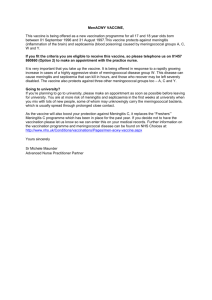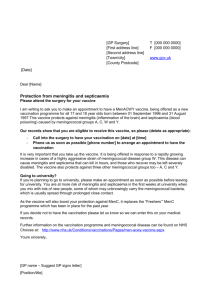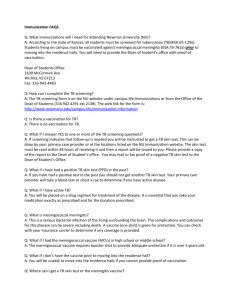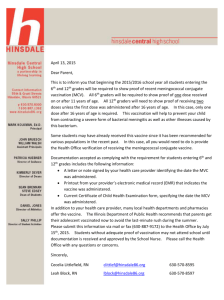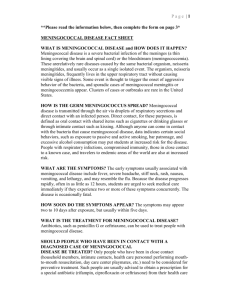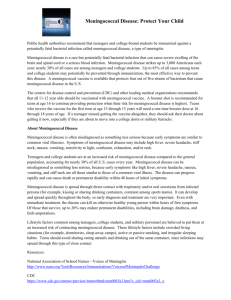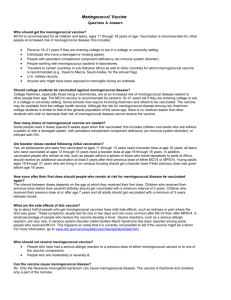December 2014 | Page 1 of 3 What is meningococcal disease
advertisement
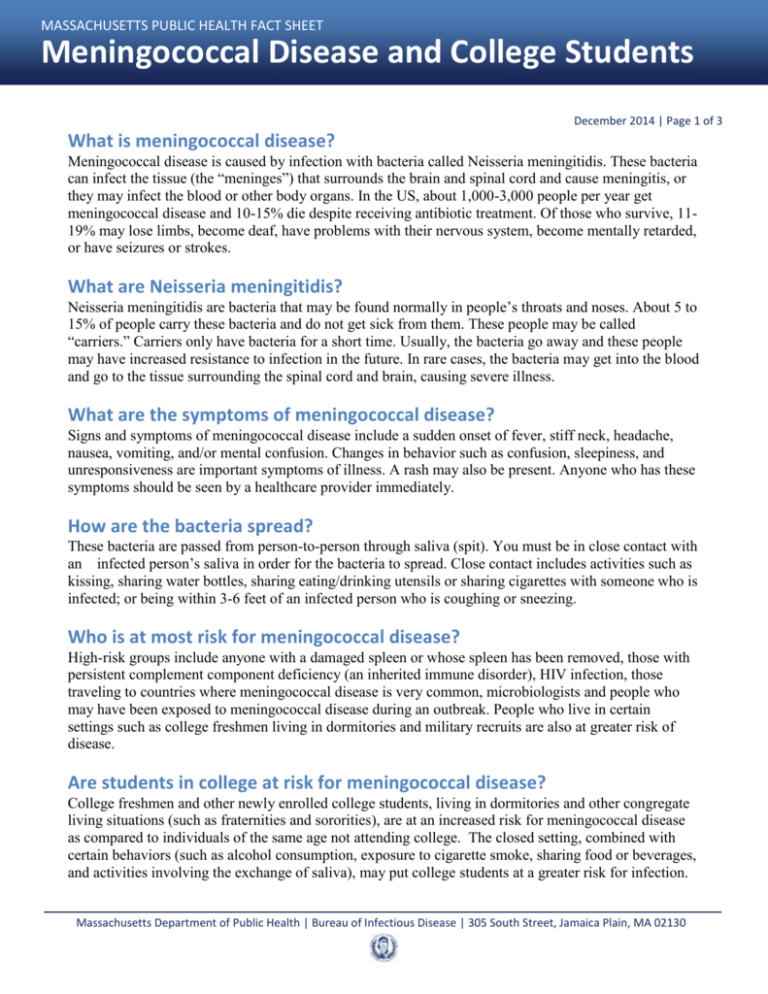
MASSACHUSETTS PUBLIC HEALTH FACT SHEET Meningococcal Disease and College Students December 2014 | Page 1 of 3 What is meningococcal disease? Meningococcal disease is caused by infection with bacteria called Neisseria meningitidis. These bacteria can infect the tissue (the “meninges”) that surrounds the brain and spinal cord and cause meningitis, or they may infect the blood or other body organs. In the US, about 1,000-3,000 people per year get meningococcal disease and 10-15% die despite receiving antibiotic treatment. Of those who survive, 1119% may lose limbs, become deaf, have problems with their nervous system, become mentally retarded, or have seizures or strokes. What are Neisseria meningitidis? Neisseria meningitidis are bacteria that may be found normally in people’s throats and noses. About 5 to 15% of people carry these bacteria and do not get sick from them. These people may be called “carriers.” Carriers only have bacteria for a short time. Usually, the bacteria go away and these people may have increased resistance to infection in the future. In rare cases, the bacteria may get into the blood and go to the tissue surrounding the spinal cord and brain, causing severe illness. What are the symptoms of meningococcal disease? Signs and symptoms of meningococcal disease include a sudden onset of fever, stiff neck, headache, nausea, vomiting, and/or mental confusion. Changes in behavior such as confusion, sleepiness, and unresponsiveness are important symptoms of illness. A rash may also be present. Anyone who has these symptoms should be seen by a healthcare provider immediately. How are the bacteria spread? These bacteria are passed from person-to-person through saliva (spit). You must be in close contact with an infected person’s saliva in order for the bacteria to spread. Close contact includes activities such as kissing, sharing water bottles, sharing eating/drinking utensils or sharing cigarettes with someone who is infected; or being within 3-6 feet of an infected person who is coughing or sneezing. Who is at most risk for meningococcal disease? High-risk groups include anyone with a damaged spleen or whose spleen has been removed, those with persistent complement component deficiency (an inherited immune disorder), HIV infection, those traveling to countries where meningococcal disease is very common, microbiologists and people who may have been exposed to meningococcal disease during an outbreak. People who live in certain settings such as college freshmen living in dormitories and military recruits are also at greater risk of disease. Are students in college at risk for meningococcal disease? College freshmen and other newly enrolled college students, living in dormitories and other congregate living situations (such as fraternities and sororities), are at an increased risk for meningococcal disease as compared to individuals of the same age not attending college. The closed setting, combined with certain behaviors (such as alcohol consumption, exposure to cigarette smoke, sharing food or beverages, and activities involving the exchange of saliva), may put college students at a greater risk for infection. Massachusetts Department of Public Health | Bureau of Infectious Disease | 305 South Street, Jamaica Plain, MA 02130 December 2014 | Page 2 of 3 The risk of meningococcal disease for other college students, in particular older students and students who do not live in congregate housing, is not increased. Is there a vaccine against meningococcal disease? Yes, there are currently 2 types of vaccines available that protect against 4 of the most common of the 13 serogroups (subgroups) of N. meningitidis that cause serious disease. Meningococcal polysaccharide vaccine is approved for use in those 2 years of age and older. There are 2 licensed meningococcal conjugate vaccines. Menactra® is approved for use in those 9 months – 55 years of age. Menveo® is proved for use in those 2 to 55 years of age. Meningococcal vaccines are thought to provide protection for approximately 5 years. Either of these vaccines is acceptable for college students. How complete is the protection with the vaccine? Currently available vaccines provide protection against serogroups A, C, Y and W-135. These 4 serogroups account for approximately two-thirds of the cases that occur in the US each year. Most of the remaining one-third of the cases are caused by serogroup B, not represented in the vaccines. Is the meningococcal vaccine safe? A vaccine, like any medicine, is capable of causing allergic reactions. The risks associated with receiving the vaccine are much less than the risk of meningococcal disease. Some people who get this vaccine have mild side effects, such as redness or pain where the shot was given. Local reactions are more common in those receiving meningococcal conjugate vaccine. These symptoms usually last for 1-2 days. A small percentage of people who receive the vaccine develop fever. Anyone who has ever had Guillain-Barré Syndrome should talk with their provider before getting meningococcal conjugate vaccine. The vaccine can be given to pregnant women. Are students required to get meningococcal vaccine before entering college? Massachusetts law requires newly enrolled full-time students attending colleges and schools with grades 9-12, who will be living in a dormitory or other congregate housing, licensed or approved by the school or college, to receive meningococcal vaccine. All students covered by the regulations must provide documentation of having received a dose of meningococcal polysaccharide vaccine within the last 5 years (or a dose of meningococcal conjugate vaccine at any time in the past). Immunizations should be obtained prior to enrollment or registration; however, students may be enrolled or registered provided that the required immunizations are obtained within 30 days of registration. Massachusetts Department of Public Health | Bureau of Infectious Disease | 305 South Street, Jamaica Plain, MA 02130 December 2014 | Page 3 of 3 The law contains exemptions. Students may begin classes without a certificate of immunization against meningococcal disease if: 1) the student has a letter from a physician stating that there is a medical reason why he/she can’t receive the vaccine; 2) the student (or the student’s parent or legal guardian, if the student is a minor) presents a statement in writing that such vaccination is against his/her sincere religious belief; or 3) the student (or the student’s parent or legal guardian, if the student is a minor) signs a waiver stating that the student has received information about the dangers of meningococcal disease, reviewed the information provided and elected to decline the vaccine. More information about this requirement may be found in the MDPH document entitled “Information about Meningococcal Disease and Vaccination and Waiver for Students at Residential Schools and Colleges”. While not required, as of October 2010, the Advisory Committee on Immunization Practices (ACIP) recommends anyone up to 21 years of age who is entering college receive a dose of meningococcal conjugate vaccine within 5 years of enrollment. College students who do not live in campus-related housing and want to reduce their risk for meningococcal disease may also choose to be vaccinated, though it is not required. Where can a college student get vaccinated? Students and their parents should discuss meningococcal disease, the benefits and risks of vaccination, and the availability of vaccine with their healthcare provider. Where can I get more information? Your healthcare provider, your local health department (listed in the phone book under government) The Massachusetts Department of Public Health, Division of Epidemiology and Immunization at (617) 983-6800 or toll-free at (888) 658-2850 or on the MDPH website at http://www.mass.gov/dph Massachusetts Department of Public Health | Bureau of Infectious Disease | 305 South Street, Jamaica Plain, MA 02130
